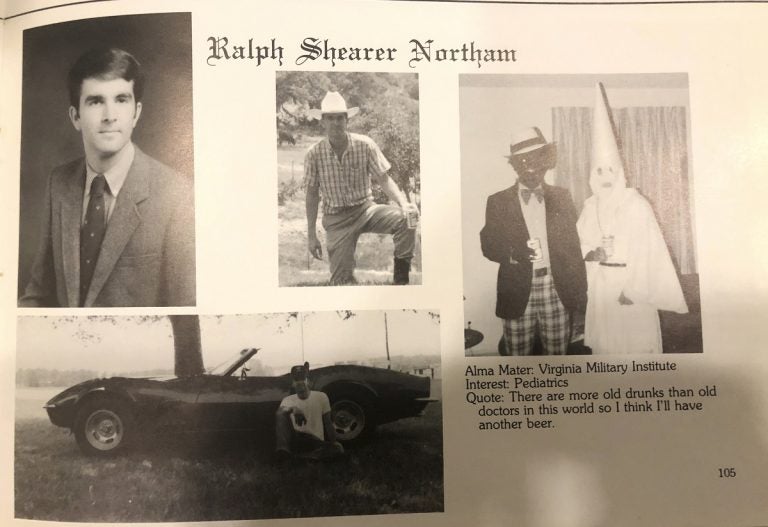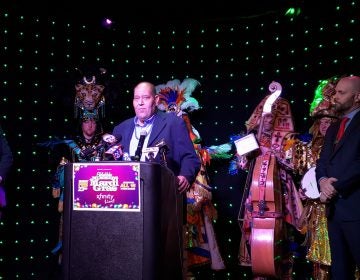The backlash to Virginia’s blackface scandal provides insight into Americans views on racism
Virginia Gov. Ralph Northam admitted that he wore blackface, and the subsequent backlash has provided insight into Americans views and knowledge of our racist past.

This image shows Virginia Gov. Ralph Northam’s page in his 1984 Eastern Virginia Medical School yearbook. The page shows a picture, at right, of a person in blackface and another wearing a Ku Klux Klan hood next to different pictures of the governor. It's unclear who the people in the picture are, but the rest of the page is filled with pictures of Northam and lists his undergraduate alma mater and other information about him. (Eastern Virginia Medical School via AP)
In Virginia Gov. Ralph Northam’s medical school yearbook photo, a man in blackface and another in Klansman attire, has brought to the forefront yet another national conversation about racism in America.
Blackface has long been used to demean and stereotype African-Americans. And as this and other scandals have proved, the practice of donning dark makeup and pretending to be black did not disappear with minstrel shows – it’s still occurring today on college campuses and on Halloween.
These sorts of incidents on matters of race, as well as the reactions to them, illuminate the country’s lack of awareness about the legacy of racism.
“The thing that grates on me is that ﹘ after all the abuse, after slavery, after everything else ﹘ then we have to come and explain to you why this is horrible. Why do I have to come as a professor all the time and explain why racism is bad?” said Anthea Butler, an associate professor of religious studies and Africana studies at the University of Pennsylvania in an appearance on WHYY’s Radio Times with Marty Moss-Coane. “Why do I have to explain to white people why blackface is bad? Why can’t you just get it?”
The Rev. Mark Tyler of Bethel AME Church in Philadelphia joined Butler on the broadcast. He said he was surprised that the reaction to Northam’s yearbook photo was focused more on blackface than on the Klansman costume.
“How is that not the story? That the person who’s studying to be a doctor ﹘ at 25 years old, not a 19-year-old freshman, but a 25-year-old about to come out of medical school ﹘ somehow thinks it’s fine in the ‘80s to portray on your page as a joke someone in a Klan outfit?”
Tyler did not try to diminish the racism of blackface, but he wanted to underscore the real life violence that the KKK has inflicted on African-Americans, including his own family.
He recounted asking his grandfather about his upbringing in Texas.
“He talked about the KKK surrounding his house as a kid. Breaking out the windows, saying ‘Come out, you little black terrapins.’ Just the terror.”
A recent Pew Research Center study determined that about a third of Americans think that blackface is “always or sometimes acceptable” as a Halloween costume.
Just last year, NBC host Megyn Kelly was fired in part for defending the practice of blackface for Halloween. She used an example from “The Real Housewives on New York” in which one of the stars faced backlash for wearing dark makeup as part of her Diana Ross costume.
Butler said of this controversy, “You can look like Diana Ross and just put a big giant wig on your head, and something flowing, and come out and say ‘reach out and touch it.’ Everybody knows who that is. You don’t have to be in blackface to do that.”
Unlike Kelly, Northam remains at his job and refuses to resign despite calls from Democratic leaders to do so. Still, a Washington Post/Schar School poll found Virginia residents split on whether Northam should resign.
Nearly 60 percent of the state’s African-Americans say they don’t want him to resign and accept his apology, which he offered at a press conference.
Tyler, though, did not feel Northam’s apology was sufficient.
“My God, he should be impeached just for that press conference!” Tyler said. “If the picture was bad, and it was, the press conference was worse. And the explanation. He does not understand the gravity of this moment, but he can begin by resigning.”
But the prospect of resignation does not seem likely. Nonetheless, Northam is currently in damage-control mode via public statements and an interview on CBS.
So how could he make up for his past misdeeds?
“Take down every Confederate statue in that damn state of Virginia,” Butler suggested. “Virginia is not ‘just for lovers.’ Virginia has been for racists for 400 years.”
WHYY is your source for fact-based, in-depth journalism and information. As a nonprofit organization, we rely on financial support from readers like you. Please give today.




